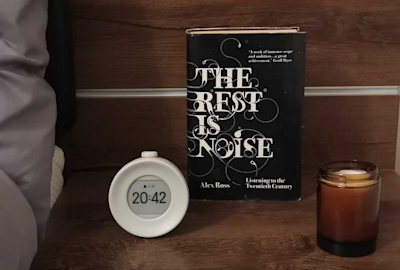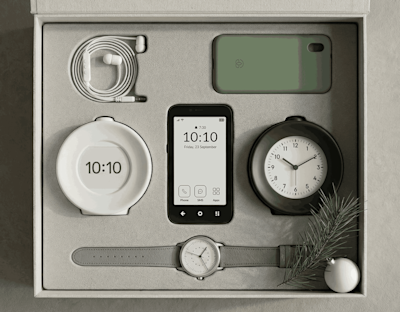
8 Reasons You Can’t Sleep at Night and What to Do About It
There are usually reasons why you can't sleep at night
We've all had those nights, when we’re staring at the ceiling, tossing and turning, feeling the frustration bubble up as the minutes tick by.
If you find yourself in this insomnia cycle often, it's time to take a closer look at what might be keeping you up. More often than not, insomnia isn’t just a pesky problem, it’s actually your body’s way of saying something is off.
Learn how to enhance your sleep habits, manage stress & create an ideal bedroom environment for a good night’s rest.
So, let’s go over the eight most common reasons you might be missing out on quality sleep and, more importantly, what you can do about it.
1. You're Anxious About Falling Asleep
Ever lie awake worrying about, well, being awake? Anxiety about sleep can kick off a vicious cycle where the more you stress, the less you sleep. This is actually the most common reason why people get into the cycle of insomnia. Your mind races with thoughts like, “What if I don’t fall asleep?” And before you know it, you’re wide awake at 3 a.m, because you’re worried about falling asleep.
READ: What causes insomnia & how to treat it
Actionable Tip: Set a consistent sleep schedule and stick to it. Use a minimalist alarm clock like Mudita Harmony to help regulate your sleep pattern without the distraction of screens. Try mindfulness exercises, as well as deep breathing or meditation, before bed to calm your mind and ease into a more restful state. Mudita Harmony features a Relaxation Library, as well as a Meditation Timer to help you relax and unwind before bed, so you get a good night's rest.
2. Your Sleep Schedule is Out of Whack
Our bodies are wired to follow a natural rhythm, known as the circadian rhythm, which dictates when we feel awake and when we feel sleepy. However, if you're a shift worker, a frequent traveler, or someone who just loves late-night Netflix binges, your internal clock can get thrown off balance.
Actionable Tip: Create a bedtime routine that encourages your body to wind down at the same time every night. As previously mentioned, the Mudita Harmony alarm clock can help by providing calming sounds or you can upload your own guided meditations to listen to before bed, helping you reset your sleep schedule and ease into sleep mode.
3. You're Stressed Out Beyond Belief
Stress doesn’t just affect your mood, it can also keep you awake at night. When you're stressed, your body releases cortisol, a hormone that keeps you in a state of alertness, which isn’t exactly conducive to sleep. If you’re stressed out, whether it’s because of work, school, or just life in general, it’s important to take steps in order to get that stress under control.
Actionable Tip: Incorporate relaxation techniques into your nightly routine. Consider using a device like Mudita Harmony, which includes features to help you unwind—think nature sounds, gentle wake-ups, and meditation. Also, try journaling before bed to offload your thoughts, so your mind isn’t racing when your head hits the pillow.
READ: The Benefits of Mindful Journaling
4. The Sleep and Mental Health Connection
Sleep and mental health are very closely connected. Conditions like anxiety, depression, PTSD, and bipolar disorder can disrupt sleep in a big way. Insomnia is often both a symptom and a trigger of these conditions, creating a challenging cycle to break.
READ: How sleep affects mental health
Actionable Tip: If you believe that you may be struggling with a mental health issue, consider speaking with a healthcare professional who should be able to advise about possible treatment options.
5. Your Body is Trying to Tell You Something Else is Wrong
Insomnia can often be a red flag for underlying physical health conditions, such as chronic pain, gastrointestinal issues, hormonal imbalances, or other sleep disorders like sleep apnea can all disrupt sleep.
Actionable Tip: If you suspect a medical issue might be at play, it’s also important to consult with a healthcare provider.
6. Your Medications Might Be Disrupting Your Sleep
Many medications can disrupt your sleep, from antidepressants and asthma inhalers to over-the-counter decongestants and stimulants. Even seemingly benign substances like caffeine or alcohol can wreak havoc on your sleep patterns.
Actionable Tip: Review your medications with your doctor and discuss any side effects. If you're taking something that impacts your sleep, consider timing it differently or exploring alternatives. Limit caffeine, alcohol, and nicotine, especially close to bedtime.
7. Your Pre-Bed Habits Aren’t Sleep-Friendly
Your daily habits, and even more specifically, your pre-bed habits, can make or break your sleep quality. Staying up late working, doomscrolling in bed, or eating large meals right before sleep are all habits that can contribute to insomnia.
Actionable Tip: Practice good sleep hygiene. Set a digital curfew and power down your digital devices at least 30 minutes before bed. Ideally, an offline bedtime routine should be anywhere from 60-90min, however, if you cannot allow this much time in the evening, make sure you go screen-free for a min of 30min. before you go to bed. Use Mudita Harmony to meditate or play soothing relaxation sounds that help create a pre-sleep routine, signaling to your body that it's time to wind down.
8. Your Sleep Space Isn’t a Sanctuary
Your bedroom should be your sleep sanctuary, but often it's filled with distractions. Bright lights, noisy neighbors, uncomfortable bedding, and even the wrong room temperature can all prevent you from getting a good night's rest.
READ: Simple Ways To Turn Your Bedroom Into A Sleep Sanctuary
Actionable Tip: It’s important to turn your sleep space into a serene environment. Invest in blackout curtains, a comfortable mattress, and noise-canceling devices if necessary. Did you know Mudita Harmony has preloaded colors of noise sounds, such as white noise. Additionally, it can help by providing a soft, non-intrusive wake-up without the harsh glow of a smartphone screen, ensuring your space stays calm and dark throughout the night.
Mudita Harmony features a variety of color noise options to help you fall asleep fast.
Final Thoughts: Prioritize Your Sleep
We cannot underscore how important sleep is to health and overall well-being. It's not a luxury, it’s a necessity for a healthy, happy life. If insomnia or sleepless nights are regularly keeping you up at night, it’s essential to look deeper and address what might be causing it.
From managing stress to creating a calming sleep environment, there are many actionable steps you can take to improve your sleep quality.
Remember, sleep isn’t just about the hours you log, it's about the quality of those hours. By understanding what might be causing your insomnia and taking concrete steps to address it, you can move towards more restful nights and better days.
Don’t wait! Start tonight with mindful choices, sleep-friendly habits, and Mudita Harmony! Your body and mind will thank you.
On our resource page, Sleep Better, we write extensively about the importance of sleep and the positive impact a good night’s rest has on our health and overall well-being. Check it out for addition sleep-related information.
If you would like to read more articles about the importance of sleep, rest & relaxation, check out these additional articles:
Also consider joining our Mudita Community on our forum.
Related stories

Mudita’s Community-Curated Wintertime Reading List
Slow down this winter with our community-curated reading list from the Mudita Forum Community, featuring books on well-being, focus, simplicity & mindful tech.

Introducing 8 Days of Mindful Gifting
Mudita presents 8 Days of Mindful Gifting. One new promotion each day, Dec 5–12 at 12:00 CET. Visit daily for meaningful, intentional gift ideas.

The Mudita Radiant Story: Kickstarter Finished & Pre-Orders Begin
Mudita Radiant’s Kickstarter campaign has ended with great success. Pre-orders are now open on our website. Discover our mindful Swiss automatic field watch.
If you'd like to receive the best stories from our blog, keep up to date with our progress and get notified about our product releases and special discounts.